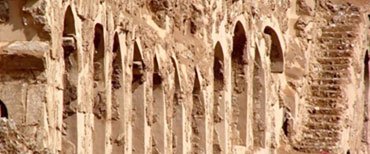 known in Roman times as Sergiopolis, was a city located in Syria. It is an archaeological site situated south-west of the city of Ar-Raqqah and the Euphrates. The site dates back to the 9th century BC, when a military camp was built by the Assyrians. During Roman times it was a desert outpost fortified to defend against the Sassanids. It flourished as its location on the caravan routes linking Aleppo, Dura Europos, and Palmyra was ideal. Ar-Rasafeh had no spring or running water, so it depended on large cisterns to capture the winter and spring rains. Ar-Rasafeh was planted right in the path of the Persian-Byzantine wars, and was therefore a well-defended city that had massive walls that surrounded it without a break. It also had a fortress. In the 4th century, it became a pilgrimage town for Christians coming to venerate Saint Sergius. Sergius was a Roman soldier who was persecuted for his Christian faith. Sergius was brought to Ar-Rasafeh for his execution, and there he became a martyr for the city. A church was built to mark his grave, and the city was renamed Sergiopolis .
known in Roman times as Sergiopolis, was a city located in Syria. It is an archaeological site situated south-west of the city of Ar-Raqqah and the Euphrates. The site dates back to the 9th century BC, when a military camp was built by the Assyrians. During Roman times it was a desert outpost fortified to defend against the Sassanids. It flourished as its location on the caravan routes linking Aleppo, Dura Europos, and Palmyra was ideal. Ar-Rasafeh had no spring or running water, so it depended on large cisterns to capture the winter and spring rains. Ar-Rasafeh was planted right in the path of the Persian-Byzantine wars, and was therefore a well-defended city that had massive walls that surrounded it without a break. It also had a fortress. In the 4th century, it became a pilgrimage town for Christians coming to venerate Saint Sergius. Sergius was a Roman soldier who was persecuted for his Christian faith. Sergius was brought to Ar-Rasafeh for his execution, and there he became a martyr for the city. A church was built to mark his grave, and the city was renamed Sergiopolis .
History of Ar-Rasafah
The site dates to the 9th century BC, when a military camp was built by the Assyrians. During Roman times it was a desert outpost fortified to defend against the Sassanid Persians, and a station on the Strata Diocletiana. It flourished as its location on the caravan routes linking Aleppo, Dura Europos, and Palmyra was ideal.
Ar-Rasafeh was planted right in the path of the Roman–Persian wars, and was therefore a well-defended city that had massive walls that surrounded it without a break. It also had a fortress.
In the 4th century, it became a pilgrimage town for Christians coming to venerate Saint Sergius, a Christian Roman soldier said to have been martyred in Ar-Rasafeh during the Diocletianic Persecution. A church was built to mark his grave, and the city was renamed Sergiopolis. Indeed, it became the “most important pilgrimage center in Byzantine Oriens in [the] proto-Byzantine period”, with a special appeal to the local Arabs, especially the Ghassanids.
In the 8th century, the Umayyad Caliph Hischam ibn Abd al-Malik (r. 724–743) made the city his favoured residence, and built several palaces around it, when the news of Holagu’s crimes in Bagdad reached the inhabitants of Ar-Rasafeh, they left for Salamieh and deserted the area. Ar-Rasafeh remained with its huge buildings to tell about its glory.
Butheina Alnounou

